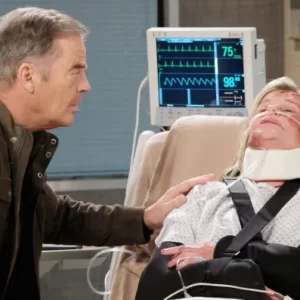In a jaw-dropping turn of events that has left Salem in a state of disbelief, EJ DiMera’s recent shooting has triggered an avalanche of rumors, theories, and emotional fallout. What was initially believed to be a straightforward case of attempted murder has evolved into a twisted narrative of deception, memory gaps, and possibly even self-inflicted wounds. The question everyone is asking now is: Did EJ actually shoot himself?
The drama ignites with a confrontation that seemed destined to end in disaster. A tense face-off between EJ and Johnny took place in a dimly lit room, a setting straight out of a suspense thriller. With Johnny clutching a gun and emotions boiling over, EJ remembers nothing past that moment — just Johnny’s furious eyes and the glint of steel before everything faded to black. This memory has fueled speculation that Johnny may have been responsible for the shooting.
But Johnny tells a very different story.
According to him, the encounter didn’t end in violence. He insists he calmed EJ down, talked him out of doing something rash, and walked away — leaving EJ alive and unscathed. “I talked him out of it,” Johnny says with a tremble in his voice. “I took the gun and I left. I swear, that’s all that happened.” Yet his conviction is shadowed by the weight of guilt. Is he hiding something? Or is EJ’s mind, clouded by trauma, rewriting history?
Medical professionals have weighed in — trauma can distort memory. Could EJ be remembering a confrontation that didn’t quite happen the way he believes? Or worse, is he covering up something far more unsettling?
Then comes a moment that stuns viewers. In a deeply emotional scene, EJ and Johnny share an embrace so raw it borders on unsettling. Through tears, EJ whispers, “You brought me back to life… you convinced me to live even when I was ready to die.” It’s a touching moment of apparent reconciliation — but it raises more questions than it answers. Was EJ teetering on the edge of self-destruction that night? Did Johnny actually save him from himself?
Or is EJ rewriting the script, casting Johnny in a hero’s role for reasons that are still murky?
The emotional fog thickens when Johnny, clearly overwhelmed by EJ’s gratitude, asks, “How can you stand by me after what I did?” The line drips with implication. Did Johnny hurt EJ after all? Or is he burdened by survivor’s guilt — haunted by what he nearly witnessed or failed to prevent?
EJ’s reply, full of warmth and forgiveness, only deepens the mystery. “You forgave me for my wrongdoings, Johnny. And I love you.” It’s a powerful exchange — but it fails to clarify what really happened that night. If Johnny truly shot EJ, how could forgiveness come so fast? And if he didn’t, what exactly is he being forgiven for? 
Just when things seem to be settling, another shocking detail comes to light: At the time of the shooting, EJ was holding Johnny’s gun.
This changes everything.
If EJ had possession of the weapon, it drastically weakens the theory that Johnny pulled the trigger. So, what happened after Johnny left? Was EJ left alone, his mind racing, the gun in his hand — and did he make a terrible, irreversible decision?
This revelation throws open the possibility that EJ may have shot himself.
Whether driven by a moment of emotional collapse or some more strategic motive, the idea that EJ could be responsible for his own injury is as horrifying as it is compelling. It reframes the entire narrative, especially EJ’s cryptic remarks about Johnny convincing him to live. Could those have been literal?
If this theory is true, then EJ’s embrace, his gratitude, even his forgiveness — all may be attempts to cover the deeper truth: that he is the one who pulled the trigger.
But there’s another, darker theory in circulation — that EJ might be manipulating the situation for his own gain. If so, this wouldn’t be the first time a DiMera used trauma for strategy. Could he be playing on everyone’s sympathies? Is EJ casting himself as a victim to distract from another secret, or to gain leverage?
This leads us to an uncomfortable question: is EJ lying not just to his loved ones, but also to himself?
Psychologists say survivors of self-inflicted harm often create false narratives to cope with shame. Could EJ’s “memory” of Johnny as the aggressor be a defense mechanism? Or is it part of a more calculated effort to hide what really happened?
The emotional weight of EJ’s storyline only intensifies as fans react. Online forums have exploded with conflicting theories. Some fans argue that EJ is spinning an elaborate lie, manipulating everyone around him for personal gain. Others see a broken man at war with his own demons, whose actions are cries for help. A few even float the possibility of a third party — someone unknown who may have entered the room after Johnny left and shot EJ, using the confusion to remain unseen.
With so many possibilities, the truth remains maddeningly elusive.
This storyline is not just a plot twist — it’s a character study in confusion, desperation, and guilt. Whether EJ is a tragic soul unraveling under pressure or a master manipulator steering the entire narrative remains to be seen. But one thing is clear: no one in Salem will be left untouched by the fallout.
If EJ shot himself and the truth comes out, the emotional aftershocks will be seismic. Johnny may feel betrayed, viewers will question EJ’s mental health, and the entire DiMera family will need to reassess their loyalties. If a third party was involved, then another storm is on the horizon. But if this was all orchestrated by EJ himself… then Salem’s most twisted mind game has only just begun.
EJ’s saga now stands as a gripping exploration of trauma, truth, and the fictions we create to survive. It’s a storyline steeped in psychological complexity, turning Salem into a pressure cooker of secrets and suspicions. As the dust settles, everyone is waiting for answers — but in true Days of Our Lives fashion, those answers will come with even more questions.
Will Johnny’s version of the story be proven true? Is EJ hiding a painful secret, or is he crafting a new lie? Is Salem ready for the truth — whatever it may be?
Stay tuned. Because one thing is certain: this isn’t the end of the story. It’s just the beginning.





